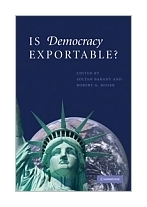|
||
podział tematyczny • wydawnictwa anglojęzyczne podział tematyczny Newsletter: • Zamów informacje o nowościach z wybranego tematu Informacje: • sposoby płatności i dostawy • kontakt • Cookies na stronie • Regulamin zakupów Szukasz książki? Pomożemy Ci! Zadzwoń 512 994 090 Napisz poczta@ksiazki24h.pl |
IS DEMOCRACY EXPORTABLE?BARANY Z.D. BARANY Z. EDITOR MOSER R.G EDITORwydawnictwo: CAMBRIDGE UP , rok wydania 2009, wydanie Icena netto: Can democratic states transplant the seeds of democracy into developing countries? What have political thinkers going back to the Greek city-states thought about their capacity to promote democracy? How can democracy be established in divided societies? In this timely volume a distinguished group of political scientists seeks answers to these and other fundamental questions behind the concept known as "democracy promotion." Following an illuminating concise discussion of what political philosophers from Plato to Montesquieu thought about the issue, the authors explore the structural preconditions (culture, divided societies, civil society) as well as the institutions and processes of democracy building (constitutions, elections, security sector reform, conflict, and trade). Along the way they share insights about what policies have worked, which ones need to be improved or discarded, and, more generally, what advanced democracies can do to further the cause of democratization in a globalizing world. In other words, they seek answers to the question, Is democracy exportable? Contents Introduction: promoting democracy Marc F. Plattner; Part I. A Moral Imperative?: 1. The morality of exporting democracy: an historical-philosophical perspective Thomas L. Pangle; Part II. Structural Preconditions: 2. Re-integrating the study of civil society and the state Sheri Berman; 3. Encountering culture M. Steven Fish; 4. Does democracy work in deeply divided societies? Daniel Chirot; 5. Democracy, civil society, and the problem of tolerance Adam Seligman; Part III. Institutions and Processes: 6. Electoral engineering in new democracies: can preferred electoral outcomes be engineered? Robert G. Moser; 7. Does it matter how a constitution is created? John Carey; 8. Building democratic armies Zoltan Barany; 9. Democratization, conflict, and trade Edward Mansfield and Jack Snyder; 10. Exporting democracy: does it work? Mitchell Seligson, Steven Finkel, and Aníbal Pérez-Linán; Conclusion Nancy Bermeo. 316 pages, Paperback
Po otrzymaniu zamówienia poinformujemy, |


